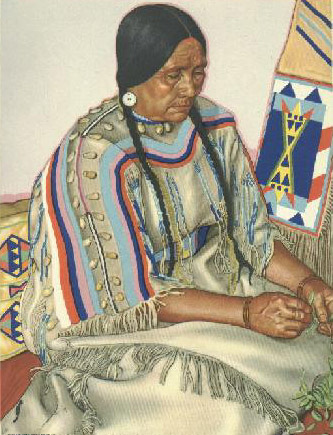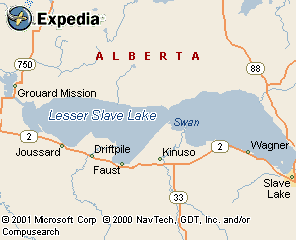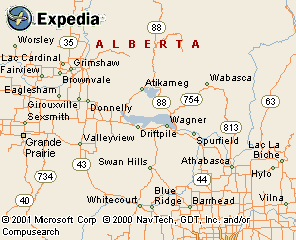|
|
Canku Ota |
|
|
(Many Paths) |
||
|
An Online Newsletter Celebrating Native America |
||
|
August 25, 2001 - Issue 43 |
||
|
|
||
|
Elders Determined to Pass on Their Native Wisdom |
||
|
by Lisa Gregoire, Journal Staff Writer The Edmonton Journal-August 20, 2001 |
 She has
never tasted alcohol, doesn't know how to use a computer and remembers long days in grassy river valleys when people
needed neither. She has
never tasted alcohol, doesn't know how to use a computer and remembers long days in grassy river valleys when people
needed neither. Sometimes Mary Kappo, 79, feels out of touch with her native brethren, especially the young people, because she has very little "book learning" and doesn't approve of drugs and alcohol. She needn't worry about that this week. Starting today, Kappo will join about 200 other native elders on the northern shore of Lesser Slave Lake. They will gather where there are no cars, no bottles of whisky and no Internet, these elders who can still remember hunting, sewing, camping and making peace with white people on Alberta's plains and who collectively live and breathe the history of Alberta's First Nations. "Their main objective is to get all the elders together and get involved and get young people to listen to them. It's so important. There are so many teachings we have to pass on," said Kappo from her home at Sturgeon Lake First Nation. "Our elders -- my elders -- didn't expect to come to me. I had to go to them when I needed advice. Nowadays, it's gradually coming back, but for a while, they thought elders had no book learning and no computers and that they didn't know nothing. Our culture here on the reserve is completely lost." Facilitating a cultural, political, social and educational exchange for elders grew out of a desire to find a permanent place for elders in the decision-making process -- a promise made two years ago by native leaders attending the centennial anniversary of the signing of Treaty 8 in Grouard. Last year, 115 elders representing 17 First Nations around the province gathered at Kapawe'no First Nation for the Seventh Generation Elders' Gathering, so-named for the native custom to consider seven generations before making collective decisions. Their discussions gave way to a Grand Vision which was circulated among participants, native leaders and both the federal and provincial governments. Elders envisioned a permanent organization through which to counsel chiefs and other leaders, "regarding our rights, our issues, our goals." They are hoping to get closer to establishing that organization by the end of this week. Elders don't want to replace their elected leaders, said Dustin Twinn, who helped organize the event. They just want to make use of their wisdom, experience, language and skills. "The elders have the most direct experience and knowledge," said Twinn. "They made the transition from the land when it was used for their livelihood. With the occupation of energy exploration, they see the land, before their eyes, being destroyed. "The treaty states specifically that our mode of life would not be interfered with. But now, with new legislation like gun control, (and) the resource exploration in the North, these are grave concerns for elders." This week, elders will hear invited speakers talk about proposed changes to the Indian Act, protecting land and resources, registering guns, avoiding cancer and other illness, using alternative justice and planning for their economic future. The budget is just over $100,000. About half came from cash donations from industry partners and the other half came from donated goods and services from government. Each First Nation paid to transport its elders to the site. |
|
|
|
Alberta First Nations |
|
|
||
|
|
||
| Canku Ota is a free Newsletter celebrating Native America, its traditions and accomplishments . We do not provide subscriber or visitor names to anyone. Some articles presented in Canku Ota may contain copyright material. We have received appropriate permissions for republishing any articles. Material appearing here is distributed without profit or monetary gain to those who have expressed an interest. This is in accordance with Title 17 U.S.C. section 107. | ||
|
Canku Ota is a copyright © 2000, 2001 of Vicki Lockard and Paul Barry. |
||
|
|
|
|
|
The "Canku Ota - A Newsletter Celebrating Native America" web site and its design is the |
||
|
Copyright © 1999, 2000, 2001 of Paul C. Barry. |
||
|
All Rights Reserved. |
||


